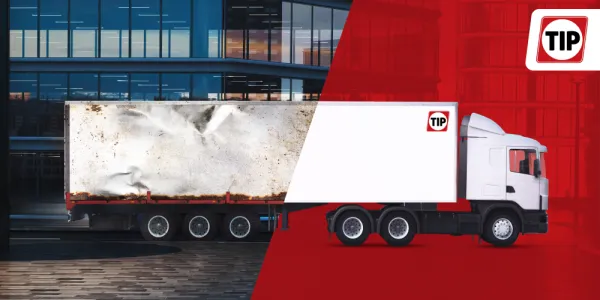Mutual recognition PTI: a win for safety and sustainability
Navigating the challenges of Periodic Technical Inspection (PTI) in today’s transport landscape, this article explores the European Union’s existing roadworthiness regulations for trailers and their broader implications. We delve into the inefficiencies and environmental costs stemming from the current PTI framework, highlighting its impact on international fleet operations. TIP Group, as active member of the European Transport Board, advocates for a reform toward mutual recognition of PTI across EU member states, ensuring the system better reflects the realities of modern cross-border transport while maintaining critical safety and sustainability standards.
"As a transport industry, we have a responsibility to uphold safety and sustainability, but we also need systems that work in today’s international landscape,” says Rogier Laan, VP of Sales & Marketing at TIP Group. “The current PTI approach feels outdated—it burdens companies and society with unnecessary costs and emissions. We have a real chance to modernize this system through mutual recognition, aligning essential safety standards with the efficiency and innovation that our industry demands."
Periodic Technical Inspection (PTI) is a mandatory safety and environmental compliance check for trailers, ensuring roadworthiness by assessing critical components such as braking systems, lighting, suspension, and emissions. These inspections are essential to maintain road safety and reduce the environmental impact of transport operations.
However, the current implementation of PTI creates significant challenges for transport companies operating internationally, forcing unnecessary travel, adding costs, and increasing emissions.
The challenge with today’s PTI system
While essential for safety and the adherence to environmental standards, the current PTI system is not designed for modern, cross-border operations. Trailers must return to their registration country for inspections, even if they are deployed elsewhere, resulting in costly, non-revenue-generating trips that generate significant CO₂ emissions.
According to the European Transport Board (ETB) and the Technical Road Transport Association (TRTA), trailers in Europe travel 189 million unnecessary kilometres annually to comply with these rules. This leads to over 80 million kilograms of CO₂ emissions and thousands of hours of lost productivity—placing a strain on companies and the environment alike.
A solution rooted in opportunity
Mutual recognition of PTI across EU member states would ensure trailers can be inspected wherever they operate, delivering substantial benefits for transport companies:
- Reduced downtime and costs: Trailers stay operational longer, with fewer non-productive trips.
- Environmental impact: Eliminating unnecessary travel could reduce annual CO₂ emissions by over 80 million kilograms across Europe, according to ETB data.
- Simplified compliance: A harmonized system streamlines operations for multinational fleets, saving time and resources.
- Improved safety: Consistent standards across countries enhance road safety while maintaining robust compliance measures.
Driving innovation through technology
Innovation and technology have the potential to redefine PTI, offering opportunities to shift from scheduled inspections to proactive, data-driven approaches. Emerging tools like telematics and Electronic Braking Performance Monitoring Systems (EBPMS) could play a pivotal role in this transformation.
"Technology holds the promise of transforming PTI," says Jan van Vugt, TIP Group's Global Maintenance and Development Director. "Telematics could allow us to monitor brakes, suspension, and tires in real time, addressing potential issues before they escalate. Tools like EBPMS might enable continuous monitoring of braking performance, reducing the reliance on manual checks. If mutual recognition of PTI continues to gain traction, these innovations will become key enablers both for the industry and regulators. They have the potential to streamline processes, enhance safety, and help fleets adapt to evolving regulations."
Building momentum: learning from successful pilots
Progress toward mutual recognition is already underway, with collaborative pilot projects showcasing its feasibility and tangible benefits. For instance, the partnership between the Netherlands and Belgium allows Dutch-registered trailers to undergo inspections in Belgium. According to the European Transport Board (ETB), this approach has the potential to eliminate up to 14.5 million empty kilometres annually for Dutch trailers alone, reducing CO₂ emissions by 6.17 million kilograms and easing road congestion by 1,692 kilometres.
Across Europe, the potential impact is even greater. If mutual recognition were widely implemented, it could prevent 189 million unnecessary kilometres of travel annually, cutting CO₂ emissions by over 80 million kilograms and reducing road congestion by 22,032 kilometres. These figures underscore how localized inspections can address inefficiencies while maintaining compliance with safety standards.
By scaling these successful pilot projects across the EU, the transport industry can move closer to a streamlined, sustainable system that benefits both companies and the environment.
How transport companies can prepare
As momentum builds for PTI reform, transport companies can take proactive steps to ensure they are ready for the changes ahead:
- Leverage telematics and smart technology: Equipping fleets with systems that provide real-time insights into trailer health and performance can streamline compliance and improve operational efficiency.
- Engage with industry developments: Staying informed about pilot projects, regulatory discussions, and technological advancements will help companies adapt quickly when reforms are implemented.
- Streamline internal compliance processes: Working with trusted partners who understand the complexities of cross-border operations can ensure smooth transitions as PTI reforms take shape.
By preparing today, transport companies can not only minimize potential disruptions but also position themselves to take full advantage of the benefits that mutual recognition and smarter PTI solutions will bring.
Ensuring high standards while driving change
TIP Group believes that the current PTI system plays a vital role in maintaining safety and sustainability in transport. However, by reforming outdated practices and embracing innovation, the industry can build on these standards to achieve greater efficiency, reduce environmental impact, and create opportunities for growth.
The shift toward mutual recognition represents a practical, achievable step toward a smarter, more sustainable future. By acting now, transport companies can help lead this change and create a better system for all.












